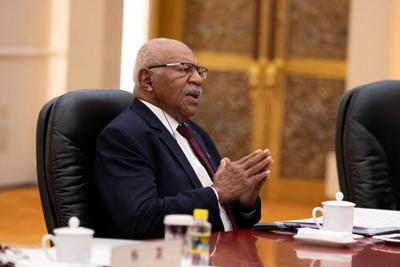Fiji’s Prime Minister Sitiveni Rabuka has declared his nation’s opposition to the establishment of a Chinese military base in the Pacific Islands. Speaking at the National Press Club in Canberra on Wednesday, Rabuka emphasized that such a base is unnecessary for China to project its power, as evidenced by a recent intercontinental ballistic missile test. The Pacific Islands, strategically located between the United States and Asia, are increasingly becoming a battleground for influence between Washington and Beijing.
Rabuka’s remarks underscore the delicate balancing act faced by Pacific nations as they navigate the growing geopolitical tensions. “Pacific leaders in all their recent discussions have tried to go for policies that are friendly to all and enemies to none – and it is a fairly tough course to steer, but it is possible,” Rabuka stated. The potential impact of a conflict over the Taiwan Strait, a scenario already being anticipated by China and other global powers, looms large over the region.
The Strategic Tug-of-War in the Pacific
The Pacific Islands have long been a focal point of strategic interest for global powers. As China seeks to expand its influence, the United States and its allies are keen to maintain their historic ties with the region. Rabuka’s comments come amid growing concerns over China’s security ambitions, particularly following its security pact with the Solomon Islands and its increasing police presence in several Pacific nations.
China’s embassy in Fiji has yet to comment on Rabuka’s statements. However, Beijing has previously dismissed the idea of establishing a military base in the Solomon Islands. Despite these assurances, Rabuka remains cautious, noting China’s recent military activities, including a missile test in September that flew over Fiji.
China’s Expanding Influence
China’s influence in the Pacific is not limited to military ambitions. In May, China showcased its coast guard capabilities to leaders of ten Pacific nations, following the registration of over two dozen vessels with a regional fisheries commission last year. Although South Pacific patrols have not yet commenced, Rabuka stressed the importance of respecting Fiji’s sovereignty and territorial waters.
Fiji’s cooperation with China in infrastructure development is a testament to the complex interplay of economic and strategic interests in the region. Rabuka emphasized that such cooperation should not hinder Fiji’s interactions with traditional allies like Australia, New Zealand, and the United States.
A Call for Regional Unity and Peace
In response to the growing strategic competition, Rabuka is advocating for an “Ocean of Peace” treaty. This proposed pact aims to ensure that external powers respect the unity of the Pacific and renounce coercion as a means to achieve security, economic, or political gains. The treaty will be a key topic at the upcoming Pacific Islands Forum meeting in September, where leaders from the 18 member nations will discuss its potential adoption.
“To manage strategic competition in the region, Rabuka is trying to build support for an Ocean of Peace treaty to ensure outsiders respect its unity and the ‘rejection of coercion as a means to achieve security, economic or political advantage’.”
As the Pacific Islands continue to navigate the complexities of international diplomacy, the region’s leaders are keenly aware of the stakes involved. The decisions made in the coming months could have lasting implications for the balance of power in the Pacific and beyond.
With the Pacific Islands Forum on the horizon, the world will be watching closely to see how the region’s leaders respond to the challenges posed by the shifting geopolitical landscape. The outcome of these discussions could set the tone for future interactions between the Pacific nations and the global powers vying for influence in the region.
 Shocking Revelations of Mass Deaths in Syrian Prison Near Damascus
Shocking Revelations of Mass Deaths in Syrian Prison Near Damascus Shocking Revelations: Mass Executions in Syrian Prison Uncovered
Shocking Revelations: Mass Executions in Syrian Prison Uncovered Paramount Settles Trump Lawsuit Over ’60 Minutes’ Interview for $16 Million
Paramount Settles Trump Lawsuit Over ’60 Minutes’ Interview for $16 Million Japan’s Upper House Election: A Crucial Test for Prime Minister Ishiba
Japan’s Upper House Election: A Crucial Test for Prime Minister Ishiba Dalai Lama Affirms Continuation of Spiritual Lineage Amidst Chinese Tensions
Dalai Lama Affirms Continuation of Spiritual Lineage Amidst Chinese Tensions